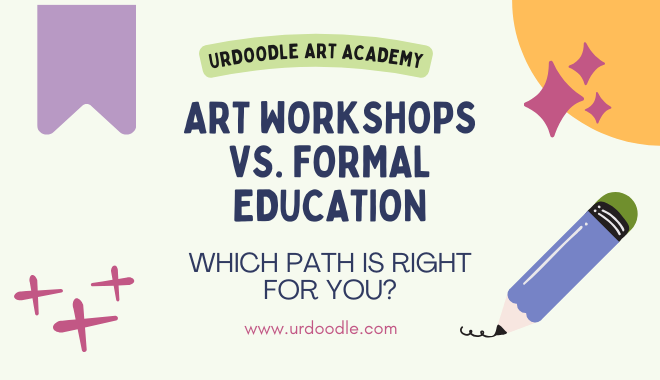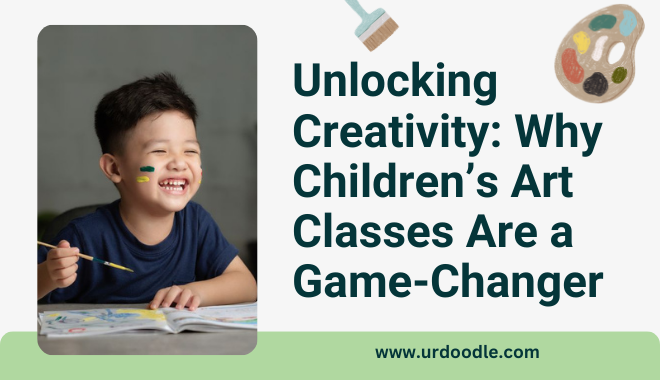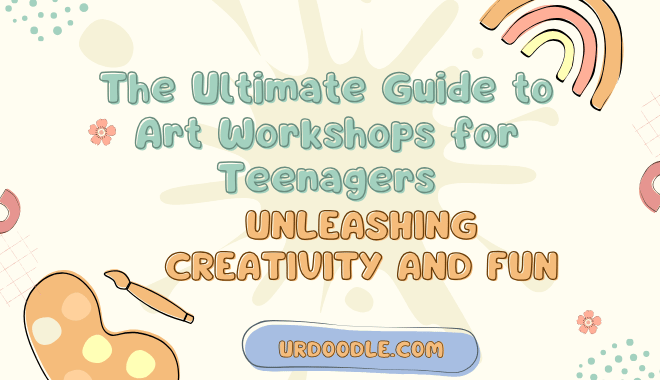When it comes to learning art, there’s no one-size-fits-all approach. Some people thrive in a structured classroom setting with a defined syllabus, while others prefer the freedom and creativity of a casual workshop. If you’re trying to decide whether to enroll in a formal art school or sign up for art workshops, you’ve come to the right place! Let’s break it all down—pros, cons, and everything in between—to help you find the best path for your artistic journey.

What’s the Difference Between Art Workshops and Formal Education?
Before we dive into the nitty-gritty, let’s clarify what we’re talking about.
- Art Workshops are short-term, focused sessions where you learn specific techniques or skills. They could last a few hours, a weekend, or a couple of weeks. Think watercolor classes, figure drawing sessions, or digital painting workshops.
- Formal Education involves attending an art school or university. This is a long-term commitment (think years) that typically leads to a degree, like a Bachelor of Fine Arts (BFA) or Master of Fine Arts (MFA).
Both paths can help you grow as an artist, but the experience they offer is wildly different. So, let’s dig into the details!
The Case for Art Workshops
1. Short and Sweet
One of the best things about workshops is how flexible they are. They’re perfect if you’re short on time or just want to dip your toes into a new art style or medium without a huge commitment. Plus, you can fit them into your schedule without rearranging your life.
2. Learn What You Want, When You Want
Workshops are focused. Want to master oil painting? There’s a workshop for that. Need help with character design for animation? You’ll find that, too. Workshops let you cherry-pick the skills you want to learn without spending time on things that don’t interest you.
3. Cost-Effective
Let’s be real—formal art education can cost a small fortune. Workshops, on the other hand, are much easier on the wallet. Sure, they might not have the prestige of a degree, but they’re a great way to learn without going into debt.
4. Hands-On and Practical
Workshops are usually all about doing. You’ll spend most of your time actually creating art rather than listening to lectures. This hands-on approach makes workshops super fun and engaging.
5. Networking Opportunities
Workshops attract people with similar interests, from beginners to pros. It’s a great chance to make connections, find mentors, or even collaborate on future projects.
6. Freedom to Experiment
You’re not locked into a single style or discipline. You can try a watercolor workshop this month and a digital illustration one next month. Workshops let you explore different paths without any long-term commitment.
The Case for Formal Education
1. Comprehensive Learning
Formal art education covers the whole spectrum of art, from theory and history to practical skills. You’ll learn about things you didn’t even know existed, which can be a huge eye-opener and help you discover new passions.
2. Structure and Consistency
Art school provides a structured curriculum that takes you step-by-step through the learning process. If you’re someone who thrives on routine and discipline, formal education might be your jam.
3. Industry Connections
Top art schools often have strong ties to the industry. Professors might be practicing artists or designers, and schools often host events, exhibitions, and networking opportunities to help you break into the professional world.
4. Access to Resources
Art schools have amazing facilities—think fully equipped studios, high-end software, and workshops for printmaking, ceramics, or 3D modeling. Plus, you’ll have access to libraries full of art books, materials, and inspiration.
5. Mentorship
Formal education gives you direct access to experienced mentors who can guide your growth as an artist. These relationships can be incredibly valuable, both personally and professionally.
6. The Degree Factor
Let’s not forget about the diploma. While art careers are more about portfolios than qualifications, some industries—like teaching or certain design roles—might require a degree.
Art Workshops: Pros and Cons
Pros:
- Affordable and flexible
- Focused on specific skills
- No long-term commitment
- Fun, interactive, and hands-on
- Great for networking and collaboration
Cons:
- No degree or formal certification
- Limited scope—may not cover broader topics like art history or theory
- Less structured, which might not work for everyone
- Fewer opportunities for long-term mentorship
Formal Art Education: Pros and Cons
Pros:
- Comprehensive, well-rounded learning
- Industry connections and professional opportunities
- Access to state-of-the-art facilities and resources
- Mentorship from experienced artists and educators
- Provides a recognized degree
Cons:
- Expensive (hello, student loans!)
- Time-consuming—requires years of commitment
- May include subjects you’re not interested in
- Rigid structure can feel limiting for free-spirited creatives
Which One Is Right for You?
Deciding between art workshops and formal education really comes down to your goals, lifestyle, and budget. Here’s a quick guide to help you choose:
Go for Art Workshops If…
- You’re a beginner and just want to explore.
- You have a full-time job or other commitments and need flexibility.
- You’re looking to sharpen specific skills.
- You’re on a tight budget.
- You’re not ready to commit to a long-term program.
Go for Formal Art Education If…
- You want to build a strong, comprehensive foundation in art.
- You’re aiming for a career that might require a degree (like teaching).
- You thrive in structured environments.
- You want access to professional-grade facilities and resources.
- You’re serious about networking and breaking into the industry.
Why Not Both?
Here’s the thing—choosing between art workshops and formal education doesn’t have to be an either/or decision. Many artists combine both! For example:
- You could start with workshops to build confidence and figure out what you enjoy.
- If you decide to dive deeper, formal education can give you a solid foundation.
- Even after graduating from art school, workshops can help you stay sharp and learn new skills.
Real-Life Stories: Workshop vs. Art School
Maria, the Workshop Lover
Maria always loved painting but never saw herself going to art school. She started with a weekend acrylic painting workshop and fell in love with the process. Over the next year, she took workshops on portrait painting, color theory, and even digital illustration. Now, she sells her art online and credits workshops for giving her the skills and confidence to follow her passion.
James, the Art School Graduate
James wanted to become a concept artist for video games, so he enrolled in a Bachelor of Fine Arts program. Art school helped him develop a killer portfolio, and through a professor’s recommendation, he landed an internship at a game studio. Now, he works full-time as a character designer.
Sofia, the Best of Both Worlds
Sofia took a few drawing workshops during high school and realized she wanted to pursue art seriously. She went on to study at a top art school and earned her MFA. Even now, she continues to take workshops to stay updated on trends and techniques.
The Hybrid Approach: Blending Workshops with Formal Education
For many aspiring artists, combining art workshops and formal education creates a perfect balance. Here’s how a hybrid approach can work in your favor:
1. Start Small with Workshops
If you’re just starting out, workshops are a great way to test the waters. They let you figure out your interests—whether it’s painting, sculpture, or digital art—without committing to a degree program. Think of it as an appetizer before the main course.
2. Use Workshops to Fill Gaps
Even after enrolling in formal art education, workshops can help you strengthen specific skills. For example, if your art school doesn’t focus on graphic design but you’re interested, you can find a workshop that fills that gap.
3. Build Confidence Before Art School
If the idea of formal education feels overwhelming, workshops can be a stepping stone. They build your skills and confidence, making the transition to art school smoother.
4. Lifelong Learning
The learning never stops for an artist. After graduating from art school, workshops can help you stay updated on new techniques, tools, and trends. They’re also a great way to meet like-minded creatives and reignite your passion for art.
Budgeting for Art Education
One of the biggest deciding factors between workshops and formal education is the cost. Let’s compare the expenses:
Art Workshops:
- Single workshops: $50–$500, depending on the duration and instructor.
- Online workshops: Often cheaper, ranging from $10–$100.
- Travel expenses: If attending an in-person workshop far from home.
Formal Art Education:
- Tuition fees: $10,000–$50,000 per year for art schools (or more).
- Supplies: Art materials, software, and books can add $1,000–$3,000 annually.
- Living expenses: Rent, food, and transportation for full-time students.
Workshops clearly win in terms of affordability, but if you’re serious about a long-term art career, formal education may be worth the investment—especially with scholarships or financial aid.
Popular Platforms for Art Workshops
The internet has made it easier than ever to access art workshops, whether in person or online. Here are some popular platforms to explore:
- Skillshare: Offers a wide range of art classes, from drawing basics to advanced digital techniques.
- Domestika: Focuses on creative fields like illustration, photography, and graphic design.
- MasterClass: Features courses taught by world-famous artists and designers.
- Local Community Centers: Check your area for in-person workshops or art classes.
- Social Media Groups: Platforms like Instagram and Facebook often have artists advertising their workshops.
Top Art Schools for Formal Education
If you’re leaning toward formal education, here are some globally recognized art schools to consider:
- Rhode Island School of Design (RISD), USA: Known for its rigorous programs in fine arts and design.
- Central Saint Martins, UK: A hotspot for fashion and visual arts.
- The New School’s Parsons School of Design, USA: A leader in innovative design education.
- Tokyo University of the Arts, Japan: A prestigious institution for fine arts and music.
- Florence Academy of Art, Italy: Perfect for those who love classical techniques.
What the Experts Say
Pro-Workshop
“Workshops give you the freedom to explore without the financial and time commitments of art school. Plus, they’re perfect for professionals who want to upgrade their skills without stepping away from their careers.”
– Emma, Professional Illustrator and Workshop Instructor
Pro-Formal Education
“Art school is more than just learning techniques—it’s about immersing yourself in an environment where you’re constantly inspired by peers and mentors. The connections you make can shape your career.”
– David, MFA Graduate and Concept Artist
FAQs About Art Workshops and Formal Education
1. Can I succeed as an artist without formal education?
Absolutely! Many successful artists are self-taught or rely on workshops to develop their skills. Your portfolio and dedication matter more than a degree.
2. Are workshops enough to launch a professional art career?
Workshops can give you the skills to create a killer portfolio, which is key for many art careers. However, formal education may open doors in fields like teaching or working with certain design firms.
3. Is it possible to switch from workshops to art school later?
Yes! Many students start with workshops to build their skills and confidence before transitioning to formal education.
4. Are online workshops as effective as in-person ones?
That depends on your learning style. Online workshops are convenient and affordable, but in-person workshops offer more interaction and hands-on feedback.
The Bottom Line: Choose What Works for You
At the end of the day, whether you choose art workshops, formal education, or a mix of both, the most important thing is to keep creating. Each path offers unique benefits, and neither is inherently better—it all depends on your goals, budget, and learning style.
So, grab that sketchbook, canvas, or tablet and start your artistic journey today. Whether you’re painting in a classroom or doodling in a workshop, the only wrong choice is not starting at all.
There’s no “right” choice—only what works for you. Art workshops are fantastic for experimenting, learning specific skills, and staying flexible. Formal education provides a deeper dive into the art world, offering structure, mentorship, and professional connections.
Whether you choose workshops, formal education, or a mix of both, the most important thing is to keep creating and growing as an artist. So grab your brushes, pencils, or stylus, and get started on your unique artistic journey!



